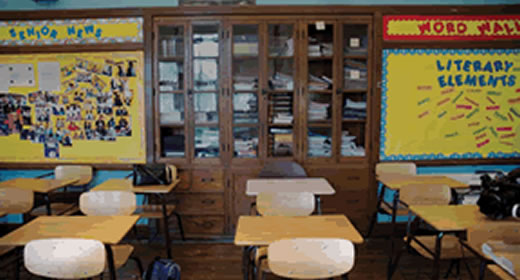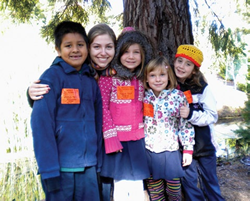
Teach for America a destination for service-minded Ford School undergraduates
Elam Lantz entered the Ford School with an eye on the biggest of policymaking stages, Washington, DC. But he soon reassessed his approach to making the world a better place. "I realized I needed to be on the front lines, in the trenches, for a few years," said Lantz (BA '10). "I needed to be able to affect change on a smaller level before I would feel comfortable or confident doing it on a bigger level."
Lantz decided to make an immediate impact with Teach For America (TFA), which trains recent college graduates of all disciplines to teach in low-income rural and urban school districts. He's now in his second year working with special-needs students at an elementary school in the Bronx. According to the organization's website, more than 9,300 TFA corps members will teach 600,000 students during the 2011-12 school year.
Teach For America has become an increasingly popular postgraduate option for the Ford School's BA students, who confront real-world policy problems head on and learn something about themselves in the process.
"I didn't plan on doing this at all," said Amanda Canvasser (BA '10), who spoke to a TFA recruiter her senior year and now teaches social studies at Crockett High School on Detroit's east side. "I never really thought of myself as someone who was a die-hard education advocate."
Lantz credited Professor Sheldon Danziger's social inequality policy seminar and Professor Brian Jacob's education policy seminar for piquing his interest in Teach For America.
"Both of those classes were directly applicable to my decision," he said. "We had a TFA representative come speak to [Jacob's] class and I got very excited about the work she was describing."
Emma Uman (BA '09) said Danziger's seminar provided insight into the obstacles her students faced outside the classroom.
"That really opened my mind to issues affecting people who live in poverty, who tend to be the same families you work with in Teach For America," said Uman, who now works in the Washington, DC office of U.S. Representative John Lewis (D-GA).
Uman had an eye on Teach For America after hearing TFA founder and CEO Wendy Kopp speak on campus her sophomore year. Kopp's message of education equality resonated with Uman. Her older brother had attended Seattle's faltering public schools, which convinced their parents to put Emma on another path.
"I went to private school my whole life and definitely saw what a great education I got, but also realized I was really lucky my parents had that option," said Uman, who spent her two-year TFA commitment teaching second grade in San Jose, California.
 |
|
Atop the Empire State Building: Lantz (back left) and his students on a class trip. |
TFA corps members also continue their own education, often taking classes to receive a master's degree in education as a condition of the program. (Lantz and Canvasser are both doing so.) But it's the lessons learned as they attempt to overcome barriers hindering public education that really hit home.
Lantz said he has combated the misconceptions of parents and administrators, who believe students who have trouble learning in traditional classroom settings "should be kicked out of the classroom." He spent last year in a fifth-grade special education classroom and now works in small groups with third and fourth graders who need extra help with reading or math.
"There are a lot of students who I think would benefit from learning in different ways and would be able to demonstrate that they're capable and intelligent through other means than standardized testing," he said. "It's very frustrating for me."
Uman, who recalled her school closed for five days due to a state budget shortfall, said "there are a lot of systemic problems that prevent teachers from being the best they can be."
"It's a funding issue, and it's a leadership gap in terms of administration and principals," she said. "I think some of the contract policies that have been negotiated between unions and districts are not necessarily what's best for kids. But nobody's really talking about the intricacies of what's created the system that we have."
At times, Teach For America provides a forum to get into those issues. At a recent TFA training, Canvasser said they discussed how Detroit Public Schools started to decline when the parents of today's students were attending classes, and how that has contributed to a culture of undervaluing education.
 |
|
Uman on a field trip with her second grade students in California. |
"There's not that motivation to get out and do well and go to college, and the students are so far behind," said Canvasser, who grew up in the affluent suburb of West Bloomfield, a 25-minute drive from Detroit. "It's night and day, and it's so sad to see these students don't have the same opportunity just because they were born in a different city."
Frustrations aside, Lantz and Canvasser both said they'd like to remain involved in education when they complete their two-year TFA commitments this summer.
"I would want there to be some teaching component," said Lantz, who would like to be a private tutor with special-needs students if he decides to go back to school after TFA. "I really enjoy working with kids with disabilities. It's something I didn't know I would enjoy."
Though she focused on Middle Eastern policy at the Ford School, studying Arabic and international policy, Canvasser wants to work on education reform in the future. Turns out she might be an advocate after all.
"I see education as the trickle-down to all the other issues in society," she said. "You can't add more jobs to a city unless people are educated; you can't solve international problems unless you're educated—it all goes back to that. It's definitely changed my focus and my policy interests."
"I think some of the contract policies that have been negotiated between unions and districts are not necessarily what's best for kids. But nobody's really talking about the intricacies of what's created the system that we have."
Photo by Lindsey Yeo
Below is a formatted version of this article from State & Hill, the magazine of the Ford School. View the entire Winter 2012 State & Hill here.